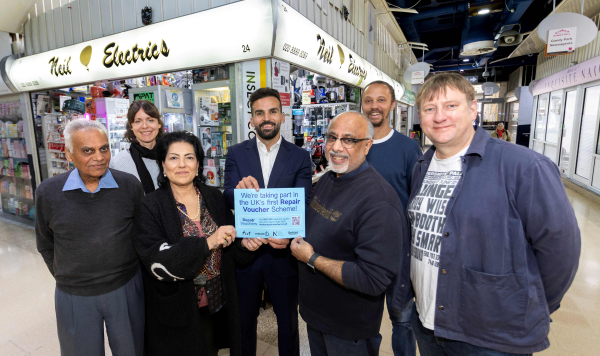North London Waste Authority (NLWA) chair, Cllr Clyde Loakes, has welcomed the publication of estimated payments to local authorities under Extended Producer Responsibility for Packaging (pEPR), by Defra. However, Cllr Loakes said some concerns remain about how the scheme will be administered.
Under pEPR, NLWA – which is responsible for managing the waste of two million residents – can expect to receive an estimated £14.5m to handle, recycle, and dispose of packaging thrown away by residents.
“NLWA has advocated and lobbied hard for many years for polluter pays measures such as pEPR, so we are relieved that it is finally coming to fruition, after years of delay and dither by the previous government,” Cllr Loakes said.
“For far too long, producers have expected someone else – council taxpayers – to pay for the disposal of their products’ packaging, which has often led to a carelessness about wasteful and tricky-to-recycle packaging.
"We are hopeful pEPR will encourage producers to save money through producing more environmentally responsible goods.
"In the long term, it is critical that pEPR is geared so that it continues to create economic incentives for producers to design out waste from packaging and to use materials that are recyclable.
“While the pEPR payment estimates are a long overdue step in the right direction, the government needs to ensure that local authorities’ costs to deal with waste are fully met across a greater number of waste types.”
Cllr Loakes expressed reservations about how the scheme will be administered, and he urged the government to ensure that business interests were not favoured at the expense of cash-strapped local authorities.
“It is imperative that no group has an outsize influence on the scheme administrator. It must be independent and impartial so that it can make fair decisions on payments from producers as well as how well a local authority manages packaging waste,” Cllr Loakes said.
Cllr Loakes welcomed the inclusion of further information about the scheme’s method to judge a local authority’s ‘effectiveness’.
“An effective, fair, and unbiased mechanism to evaluate a local authority’s performance must be developed,” said Cllr Loakes.
Cllr Loakes added that packaging EPR only covers around 29%* of north London’s waste and recycling, and that EPR should be expanded to cover as many waste streams as possible.
“An EPR scheme for textiles should be implemented as a matter of priority,” Cllr Loakes said.
Furthermore, Cllr Loakes expressed concern over the significant costs local authorities will face under the planned expansion of the Emissions Trading Scheme.
“The government’s current plans to expand the ETS to cover energy-from-waste facilities will cost north Londoners millions of pounds and force them into a system which carries high and extremely volatile costs. If this scheme goes forward then it is essential that these costs are fully met through EPR schemes for packaging and additional materials to ensure that the incentive to decarbonise is targeted at the producers of material, not the local authorities which have no control over the waste they receive.”
Cllr Loakes also called on the government to reincorporate littered packaging, which nationally costs council taxpayers £384M** into the pEPR system.
The seven north London boroughs that NLWA serves, will also receive payments for the collection of packaging waste and recycling. These figures will be analysed over the coming days to ascertain whether all costs have been fully considered by the government.
* Based on data from NLWA’s recent waste composition analysis, which suggested that 19% of north London’s household residual waste and 62% of household dry mixed recycling (a combined figure of 29%) is in scope of pEPR.
** According to WRAP.





